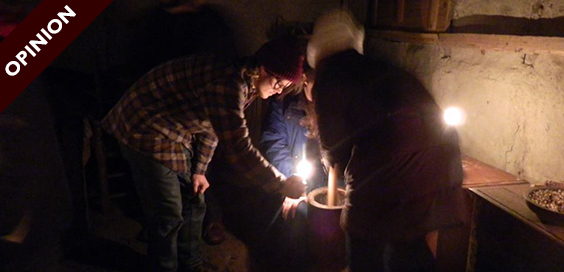The passage is narrow and the stairs are steep, my claustrophobia is brewing under the surface and my legs are crying, literally sweating from the effort. I am climbing up the Arc de Triomphe and questioning whether paying money to climb lots of steps of a landmark that is best recognized from across the street is worth it.
We get to the top for our selfie with an aerial view of the “city of love,” and I think about what it would have been like in post-revolutionary, monarchy-restoration France to see their city like this. I think about the legacy of Napoleon and why such a display of grandeur, really quite gaudy, makes sense for Napoleon to begin building and the July monarchy to finish. I think about the value of monuments and national identity and what sort of iconic monuments are in the United States, such as Mount Rushmore. What makes someone want to build something so huge and without practical use whatsoever?
Another trip, another season, I am transported back to 1621 in the Plymouth colony, standing next to a fire, stirring a pot of soup and nudging my toes closer to the flame, attempting to regain some feeling in them. We are trying to cook a Pilgrim dinner in recreated Pilgrim huts in the middle of January with General Bradford and his wife (played by reenactors who never broke character) telling us about their life in the colony.
After this evening, the Interim group discussed what we learned. We learned about the characters who first sailed for the new world, what they did to survive, what winter was like without modern luxuries and much more.
These are just two of countless moments I have spent outside the classroom discovering the world. Due to movements in the government toward common curriculum and standardized testing, our current educational landscape stresses learning for the test with the goal of getting a high score, not of learning the material. These movements are at the primary and secondary levels; however, they set the expectations of learning that carry out through university levels.
This approach to education tends to emphasize learning through lecture, through information dissemination from a single teacher to a room of quiet students taking notes furiously so they can memorize the information for the test.
It does not develop an interdisciplinary understanding of the world, experience in looking at the world through critical analysis or the ability to look for creative solutions that break the status quo. From my own experience, I have learned much more through seeing the world, the mountains, the monuments and the movements, than from taking notes in a classroom.
Albeit, the model I am proposing shows preferential treatment to the humanities and there are some things that just need to be learned as fact. No one will solve a quadratic equation without the quadratic formula…or wolfram alpha. But our mission at Calvin lies in the interdisciplinary approach to God’s world, to striving to understand his creation. This can hardly be done without being in his creation.
I am not saying that everyone needs to buy a plane ticket to Paris, though I highly recommend it if you have the time and means. I am questioning the basic assumption that learning is best done in a desk and with a lecture. Many of my classes incorporate discussions, a great way to counter this assumption. My biology class took a field trip to the nature preserve. Brilliant! My English literature class sang the poems we were studying to see how they would have been actually experienced.
Studying abroad in England, I took two classes through the York St. John University. These classes were formatted so that the first hour of class was a lecture, the second hour a discussion. One of my classes studied how the development of castles and monasteries as physical structures their ideological significance. We traveled to both a castle and a monastery. As we only had one test and one paper for each class, I spent less time in class and spent less time pouring over notes to try to make sure I can name all the theories by name, yet I feel like I learned significantly more concepts.
Without the stress of trying to meet the next deadline or trying to complete daily reading assignments, I was able to spend more time contemplating the concepts I was learning and reach a much richer understanding.
An educational system that can incorporate more of these less traditional approaches to education, field trips, meeting in settings outside a classroom, discussions and movement within the classroom will ultimately be better at actually teaching the topics and inspiring students to learn about them on their own, not just train students to ask, “What of this will be on the test?”



